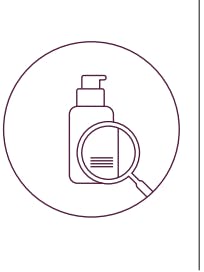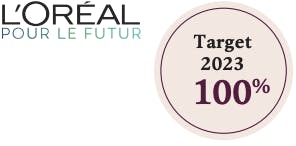B/ Raising awareness among consumers about sustainable lifestyle choices
The Group wants to empower all L’Oréal consumers to make sustainable consumption choices.
The SPOT environmental and social assessment tool, rolled out to all of the Group’s brands (excluding recent acquisitions), established the environmental and social profile of all new products in a process dating back to 2017.
Displaying the environmental and social impact of the products
As part of its new L’Oréal for the Future sustainability programme, L’Oréal has developed an environmental and social labelling system for its products, with ratings from A to E, designed to inform consumers and enable them to make enlightened consumption choices.
The labelling is built on the SPOT methodology to measure impacts, which was co-created with 11 independent international experts in accordance with the directives of the European Product Environmental Footprint (PEF), to scientifically measure the environmental and social impact of a product.
This tool for comparing products of the same category provides an accurate vision of the impact of a Group product, taking into consideration 14 planetary impact factors such as greenhouse gas emissions, water stress, ocean acidification or the impact on biodiversity.
These impacts are measured at each step in the life cycle of a product and calculated by taking into account not only the cultivation of raw materials, the processing and transport of the product, but also the usage phase by the consumer and the recyclability of the packaging.
In the case of cosmetics, as the carbon and water footprints are the most important impact factors, the Group made the choice to communicate a total environmental impact note combined with a focus on carbon and water footprints.
This information will be accessible to consumers on the product website. The first phase of the roll-out began with the Garnier hair-care category in July 2020 and now covers around twenty countries in Europe and will soon be in other zones.
In November 2021, two new brands - Biotherm and La Roche Posay - rolled out this labelling for their skin care ranges in France, followed by Vichy in December 2021.
Roll-outs in brands and zones where automated data modelling is used are expected to accelerate in 2022.
At the same time, L’Oréal is committed to a sectoral approach, coming together with its competitors to form the Eco Beauty Score Consortium, which aims to develop a methodology for rating cosmetic products, backed by a scientific methodology for measuring environmental impacts inline with the recommendations of the European Commission, similar to that used by the Group for its environmental labelling initiative. Alongside the other members, L’Oréal is committed to sharing its experience in this field within the Consortium, in compliance with anti-trust legislation.

In 2021, an environmental impact score was calculated for 76% of the Group’s rinse-off products. Labelling showing these scores, together with their social impact data, will be gradually rolled out in our markets.

Environmental and societal commitment of L’Oréal brands
Conscious of the influencing ability of its brands, L’Oréal encourages them to inform and mobilise their business partners, customers and consumers around the major environmental and societal challenges facing the world.
Each brand must therefore identify an environmental or societal cause of its own, support a community partner involved in the field, and conduct awareness-raising and outreach campaigns with its consumers in order to contribute to change.
L’Oréal Paris is therefore backing the Stand Up programme against street harassment, in partnership with the NGO Hollaback!. Since it was created, more than 550,000 people have already been trained in a method that enables them to react safely to street harassment, whether they are victims or witnesses.
